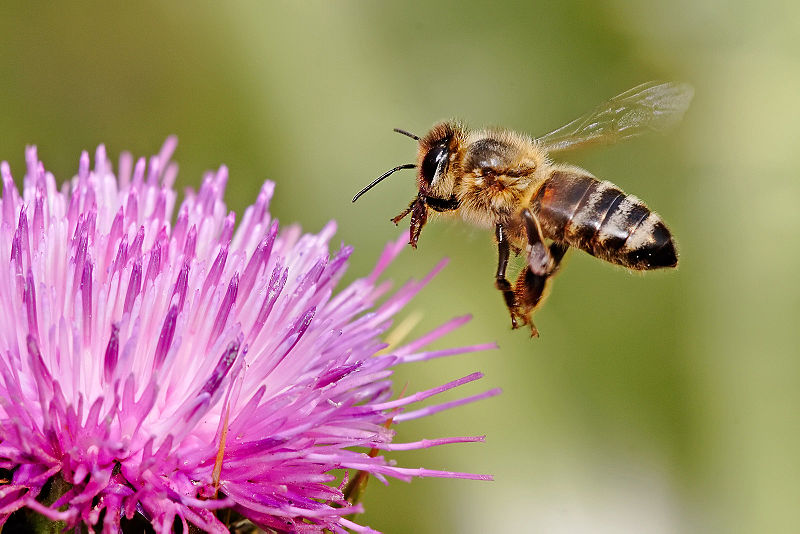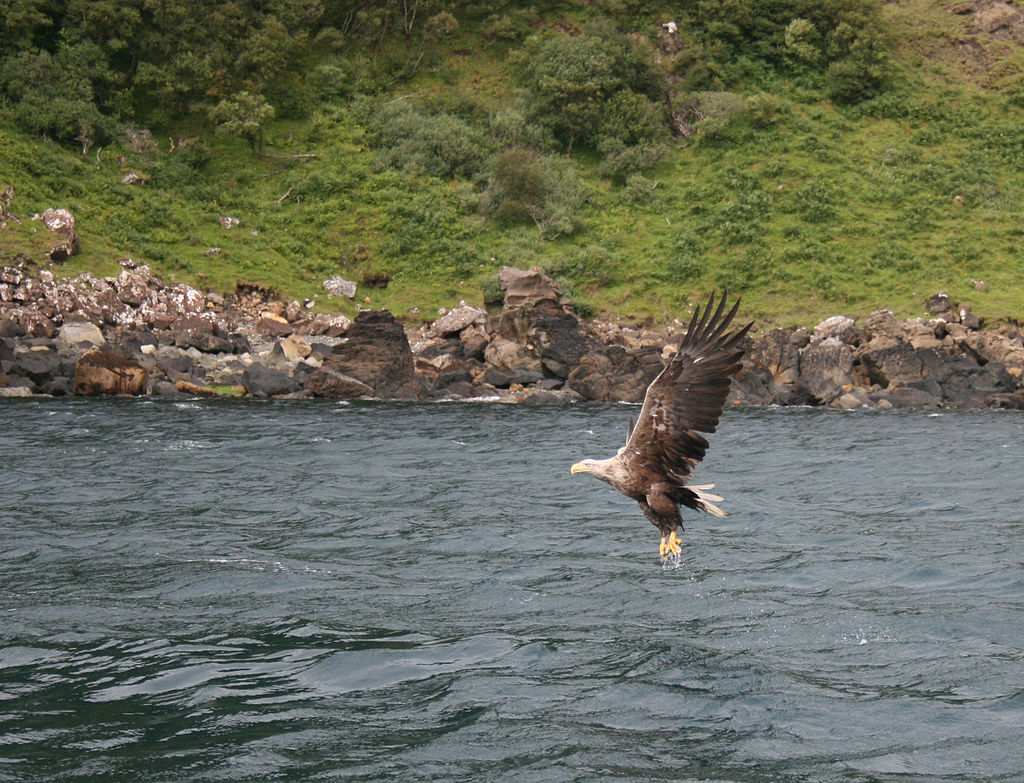Tony Juniper: Green growth
by Mark Reynolds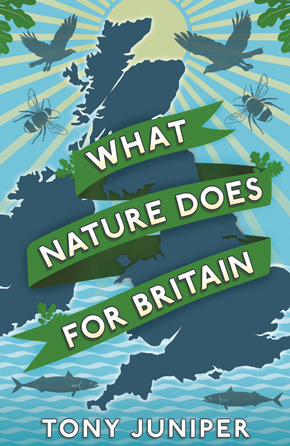
“A must-read for any one who is concerned about the way we run our country.” – Simon Barnes, Independent on Sunday
Tony Juniper’s latest book, What Nature Does for Britain, sets out to undermine the received folly that protecting nature is somehow bad for the economy and, via first-hand accounts from around the country showing how environmental damage is under repair, builds a persuasive manifesto for a greener nation. We sit down for a wide-ranging chat about voting and acting greener, why a Labour-SNP pact would work best for the environment, and the need for a new Nature and Wellbeing Act.
MR: Your previous book, What Has Nature Ever Done for Us? offers an overview of the natural services that underpin much of the world’s economic activity. As the General Election looms, this book is a wake-up call to UK voters and politicians about the dangers of neglecting our natural systems, and sets out a specific agenda for national and local policies that are in tune with nature.
TJ: Yes, the last book was an attempt to overturn the mistaken view that looking after natural ecosystems and the climate is somehow damaging to economic growth. I came to the conclusion after thirty years of activity in the environmental movement that this kind of mythology is now the main problem. Because we’re not short of science, we’re not short of good arguments as to why nature is wonderful and beautiful and inspiring, how it’s full of spiritual value and aesthetically very pleasing, how it is replete with intrinsic value; all of that we know, and most people believe that. But the reason we fail to travel in the right direction is because of this apparent choice between progress and nature. So What Has Nature Ever Done For Us? was an attempt to gather some of the technical information, turn it into an accessible narrative and put it out there and see if people could see a different way of looking at things. That basic point that there isn’t a choice between nature and progress, and the upbeat and positive narrative that was built around that I think many people found as a refreshing change to some of the doom-laden environmentalism that comes from the way the science tells us that we’re heading towards some really quite serious consequences – biodiversity and resource depletion, climate change and everything else. That led to various people saying, well this is great, but it’s of not that much practical value here in the UK, what about doing something that’s more focused on this country?
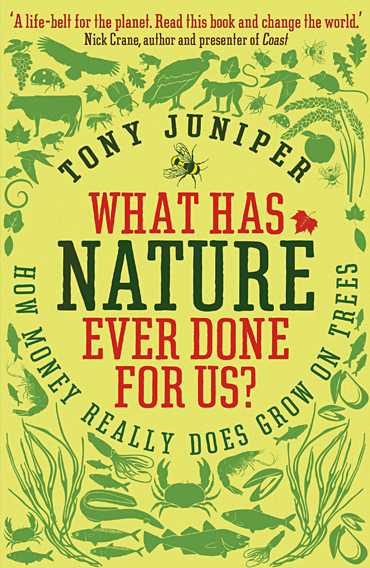 I began work on What Nature Does for Britain about 18 months ago, and was challenged to begin with by the less dramatic stories that come from a country the size of the UK compared to the whole globe, when you can talk about tropical rainforests and vultures and coral reefs. But when I began to dig into the material, and given that we’re a couple of months before a General Election, it seemed like a good opportunity to turn it into a political ask as well as a book that translates science into a more popular form. In the context of economic austerity, you can see some very strong cases whereby we could be saving money and getting more value out of what we’re paying in bills and taxes if only we took a more joined-up and integrated approach to get the maximum value out of nature at the same time as providing favourable conditions for business, cutting costs, and increasing health and security. And once you get into the level of a country, all of that starts to make a lot more sense. I felt quite challenged to begin with, whether it would be possible to paint a compelling picture, but actually at a country level it’s more compelling because you start to see where different choices could be taken by government, by local authorities and by businesses to get much better outcomes.
I began work on What Nature Does for Britain about 18 months ago, and was challenged to begin with by the less dramatic stories that come from a country the size of the UK compared to the whole globe, when you can talk about tropical rainforests and vultures and coral reefs. But when I began to dig into the material, and given that we’re a couple of months before a General Election, it seemed like a good opportunity to turn it into a political ask as well as a book that translates science into a more popular form. In the context of economic austerity, you can see some very strong cases whereby we could be saving money and getting more value out of what we’re paying in bills and taxes if only we took a more joined-up and integrated approach to get the maximum value out of nature at the same time as providing favourable conditions for business, cutting costs, and increasing health and security. And once you get into the level of a country, all of that starts to make a lot more sense. I felt quite challenged to begin with, whether it would be possible to paint a compelling picture, but actually at a country level it’s more compelling because you start to see where different choices could be taken by government, by local authorities and by businesses to get much better outcomes.
One of the things I’m actually hoping this book will do is encourage authors in other countries to do a similar thing. I was speaking to a colleague in the Netherlands yesterday and suggested he might like to write What Nature Does for the Netherlands, and Brazilian and Argentinian colleagues might do the same for their countries. Because the big global argument has to be made, but to get resonance and traction and to get policy change, you need to be working in a culturally accessible way at the national level. So hopefully What Nature Does for Britain does a bit of that, and I like the way the cover translates the message in to something that looks quite British, a bit retro.
David Cameron proclaimed that his coalition with the Lib Dems would deliver “the greenest government ever”. How spectacularly has he fallen short of that goal?
It’s one of the most unfunny political jokes in history, I think. In pretty much every element of how we achieve environmental improvement, whether it’s strong statutory bodies, legislation, guidance to local authorities, action on the global stage, we’ve gone backwards. The Liberal Democrats have to be credited with holding the line at least on some of the climate change commitments that were inherited from the Labour era, not least the Climate Change Act, and in fact I think David Cameron personally does understand this pretty well, but the difficulty he’s had is in dealing with a split party. There are climate sceptics in the Conservative Party who, when he was talking about the flooding in February 2014 and mentioned climate change as being one of the reasons why it was so bad, his backbenchers were yelling groans of derision at him, which I think spoke volumes about the extent to which his party is divided. For a lot of right-wing politicians at the moment, and you can see it in UKIP too, being anti-environmentalist has become a badge of political identity. They actually see this as being part of the right-wing offering to society, which is itself anti-science and anti-economics and anti-rationality, but nonetheless it’s taken hold in really quite a damaging way, and I think that’s one reason ‘the greenest government ever’ never appeared.
In the thirty years that I’ve been involved in environmental politics, the last five years have been the worst. We’ve actually gone backwards.”
I think David Cameron might have had some sincerity when he said that, but the political difficulties of running the coalition, and also having his own party divided, and a sceptical Treasury, and that mythology of nature and environment costing money and harming growth, have held things back. If you look at some of George Osborne’s comments since 2010 – like his idea that the European Habitats Directive is “placing ridiculous costs on British business” – that defies the evidence. Even a review by the British Government itself said this is not true, and yet that rhetoric spills out of elements of the Conservative Party. In the thirty years that I’ve been involved in environmental politics, the last five years have been the worst. We’ve actually gone backwards. We’ve had at least grudging, slow progress from the 80s, and indeed from the 70s it’s been going gradually forward. This is the first time it’s gone dramatically backwards. A lot of it has been cloaked under the guise of austerity and the need to be cutting costs, and my book shows how wrong that thinking is, in terms of how we can be saving money and giving more value by taking a more rational approach towards nature rather than rejecting it as anti-growth.
One of the ongoing environmental initiatives, The National Forest, actually traces back to Thatcher’s government. I didn’t know much it about before reading your book, is it an undertold story?
It is. And relating to the point about the right-of-centre political view in recent years, a lot of people forget that actually a great deal of environmental progress came under Margaret Thatcher’s governments, and John Major’s. So this is not naturally a Conservative idea, to be against environmental policy or environmental targets. Margaret Thatcher was the first world leader to recognise climate change as a major strategic threat. The National Forest was conceived under her government, and it was ministers in Margaret Thatcher’s cabinet who put that in train. It’s one of those rare examples of where government has taken the lead on major restoration of damaged environments in this country, repairing a large area of blighted countryside in Leicestershire and neighbouring counties, which in the process has delivered enormous economic gains with massive returns on investment in terms of recreation, wood, various local industries, a boost in tourism, and also the housing that’s being attracted there. The National Forest shows us that we can combine good design for new residential areas with the protection of nature. So it’s a great example of where government can take the lead, although it has to be said that most of the examples I talk about are coming from conservation groups – the Wildlife Trusts, the RSPB, the National Trust – those are the ones who are really giving proof of concept for a new phase of conservation. One of the most exciting observations I make in the book is about this turning point we’re now seeing in the conservation and environmental argument where we’re moving beyond protecting the last little fragments that are left of what was natural in this country, and now embarking on large-scale restoration. And doing that not only because we’re very concerned about the butterflies and the birds, but also because we’re getting flood risk reduction benefits, greener water, resilience in the face of climate change, health benefits, and all of these things you can increasingly put economic numbers around. In many cases pretty big benefits are coming in the wake of this, and not just for wildlife but for people and the economy. I find that quite motivating and exciting, and I hope that point of view begins to catch hold in the next couple of years, because we’re literally wasting money the way we are proceeding at the moment.
What do you think the next government will look like? If we end up with another coalition, will that increase or reduce the country’s appetite for proportional representation?
Well, I think increasingly people are seeing the shortcomings in our political system, how the first-past-the-post way of electing our representatives doesn’t really reflect the will of the people. But who knows whether we’ll get into a period of discussion around whether we have to change things at a fundamental level. I would like to see a more proportional system, I’d also like to see a legal obligation for people to vote, so that we’re all taking responsibility for what we are buying into, and also the ability of voters to recall politicians who are not doing their job. If we had those kinds of shifts in our political system, we’d get much more of a reflection of the true will of the people. At the moment we’ve gone back and forth between Labour and Conservative for a couple of centuries, and in the process generally excluded a vast body of opinion. The Green Party is polling around 8 per cent at the moment. If that were proportional, it would be something like 50 MPs.
I think we’re probably going to end up with a Labour-SNP coalition. Will that be greener than the coalition we have now? Very likely it will, because of the Scots’ commitment to social justice and environmental ambition.”
But the way things are there’s little prospect of any Green candidates beyond Caroline Lucas getting in.
Exactly, because of the first-past-the-post system. It’s going to be fascinating though to see what will happen as a result of the rise of UKIP and the Greens, in terms of what this will do to the main parties, especially in marginal seats. It will be a chaotic result as those smaller parties have an impact, but it won’t give those parties many seats and that’s quite tragic. Of course after 2010, when there was a referendum on whether we should take a small step towards PR, the voters rejected it, and I wonder how many of us are reflecting on the wisdom of that. But we’ll see what happens. For what it’s worth, I think we’re probably going to end up with a Labour-Scottish Nationalist Party coalition. Will that be greener than the coalition we have now? Very likely it will, because of the Scots’ commitment to social justice and environmental ambition, but we’ll have to wait and see. It could go any direction because of the way the vote is fragmented, but come May the 8th we’ll have an idea.
Should nuclear power be part of Britain’s energy mix as a short-term fix, or are the long-term environmental costs just too high?
Well it’s in been in the energy mix since the 1950s, so it has been a relatively long-term part of our energy, but looking forward I think the way to go is to invest in renewables and energy efficiency, and to see the range of benefits that come with those compared with a big commitment towards nuclear. Nuclear is massively expensive, it’s also notoriously difficult to get it online, and the new generation of reactors that the government would like to build in this country has a very unhappy track record in Finland and France right now, with two reactors of the same design having massive cost overruns and taking years longer to complete than was originally envisaged. I certainly believe there are better ways, not least of which is the opportunity to spread job creation opportunities right around the country: solar, onshore and offshore wind, wave and tidal power, anaerobic digestion. If we can get these technologies working, we could have jobs being created pretty much UK-wide, whereas with nuclear the jobs will be concentrated, the number of jobs per unit of electricity is lower, and in the case of the current plan many of the jobs would be located in France and China because these are the countries that build the reactors. And we will also of course be exporting our bill money to profits in state-owned enterprises in those countries, whereas we could be ploughing our bills into creating profits for British companies, employing young people here who need jobs. For me a big neglected part of the nuclear debate is this social side. Energy is going to be an essential part of our economy forever, so what do we want? Cheap electricity, clean electricity, rich-in-jobs electricity? We can do all three much better through the renewable and efficiency route than we can down the nuclear route. And as for gas fracking, it simply is untenable I think for this country. Nuclear and gas have been seen as the big low-carbon opportunities as far as policy has been concerned in recent years, and I think both of these are mistaken, and both are the result of very effective lobbying by vested interests from the nuclear industry and in those technologies.
This government’s enthusiasm for fracking is frankly baffling.
It is extraordinary. If you look at the way the fracking debate has developed, it’s very much in terms of those who are in favour of it from an anti-wind farm point of view. They don’t like the look of wind turbines, they think they’re ugly and a blight on the landscape, but those people are in for a terrible shock when they actually see some shale gas rigs being constructed in this country. In fact if there is going to be some shale gas fracking here, I’d really like to see it started off in Kent and Sussex, in those seats of Conservative MPs who’ve been in favour of it.
High-profile campaigns addressing declining bee numbers and fish stocks have had a positive effect in recent years. What have been the greatest success stories, and which animal groups or species are under the greatest threat in Britain today?
If you look back on the history of human influence on nature in Britain, it’s been a pretty relentless downward spiral. First of all we killed off all the big animals, the bears, the wolves and lynx and everything else, then we cleared the big natural habitats, the forests and the wetlands, and we modified many of the coasts and estuaries, and now we see the continuing decline in small things – small birds, insects, plants – and still the downward trend continues. It’s hard to spot places where we’ve actually managed to turn things around. There are a few, however, where you can see the possibilities for doing things differently, and actually some of the things that are needed are quite simple.
The return of some of our birds of prey, the reintroduction of the white-tailed eagle in Scotland, the osprey breeding again in England, the peregrine falcon coming back to the lowlands, the common buzzard now occurring in most English counties, including in the east where they were absent for a century or so. All of these things show us that simple actions can make a big difference: in the case of the birds of prey, it’s basically down to banning certain harmful chemicals like DDT, and stopping them being shot. Then there are some big wetland restoration schemes, reed bed recoveries leading to some species of heron like the bittern beginning to recover as their habitats are restored. In the seas we’re beginning to see the benefits of Marine Protected Areas, and not only for wildlife but also for fishing and for coastal businesses of other kinds. Lyme Bay in Dorset is one example I talk about in the book, where protection of the sea bed had led not only to more income from different kinds of fishing, but has also boosted angling, wildlife watching and diving, which bring in a lot of money that wouldn’t be coming if the area wasn’t being looked after. The protection of reefs and sea grass beds and other marine features will in the end be of enormous benefit to our fishing industry because these are often where the fish breed, and if you’re smashing up the habitats where they reproduce, obviously the long-term prognosis for catches is not great.
When it comes to the wider countryside, I think the penny’s beginning to drop around pollinators, and it is noticeable how the debate around bees in recent years has been more powerful as a conservation argument because we can see a real dependency between human needs and the presence of these insects. That has been a qualitative change in the discussion. I think we’re still very, very far from seeing the kinds of changes needed to properly manage the countryside, but at least the awareness is now there, and there’s some acceptance among ministers that something needs to be done. So I think the tide has turned, but the battle is very far from won. But we can see signs of hope.
You were a lead advisor on the 2008 Climate Change Act. How does that look seven years down the line?
It looks very good. At Friends of the Earth in the early 2000s I think we anticipated the likely trend on the climate discussion very well. We launched the campaign in 2005, and we were basically thinking, well this is good, Tony Blair gets it, he’s trying to put it on the global stage, we’ve got policy starting to move in the right direction, we’ve got increased public awareness. But we sat down and thought to ourselves, actually this is not going to last, one thing we can be pretty certain of is that any environmental trend, when it comes to politics and the media, is always a fashion, a fad. So what we felt we needed to do at that moment was to put something in place that would make sure that it couldn’t be dismissed in the future as something we’re no longer interested in because we ticked that box five years ago. Hence the idea of a legal framework that would require government to come back to this every year until 2050, until we’ve reduced emissions by 80 per cent.
And do you think that target is likely to be achieved?
Whether we achieve it will depend upon the politics, and that anti-environmental narrative in recent years that’s seen an Environment Secretary who’s an open climate sceptic, the Treasury pushing back on measures to meet the carbon target. We can do it. What will be crucial in determining whether or not we do, will be the next few years. The next General Election, the one coming right now, will be very important. But, you know, for a government that says it believes in the rule of law, to hear the Environment Secretary and the Chancellor saying that they shouldn’t have to meet the Climate Change Act, which is a matter of law, is utterly remarkable. In the face of the scepticism we’ve seen since 2010, I think the Climate Change Act did exactly the job we wanted it to do, which was to ensure that this could not be taken off the agenda, not without breaking the law. There are environmentalists, me amongst them, who would look for legal remedy if there is an active and consistent attempt to do that. People who commit minor offences suffer the consequences, they go to prison, and ministers in positions of enormous responsibility looking after the security of the country, if they were to break the law on something as important as this, I think they also should feel the consequences.
The overarching aim of the Nature and Wellbeing Act is to restore nature in a generation… it would explicitly set out to not only do this to improve nature for its own sake, but also to bring benefit to the country.”
With this book you’re launching the idea of a Nature and Wellbeing Act. Could you say a little about that?
This is in some ways comparable to what we achieved on climate change, insofar as we’re looking for a framework that will guide policy across the piece. At the moment the Climate Change Act doesn’t specify what should happen on transport, farming, energy or anything else, but it does set a long-term direction and helps feed into policymaking the kinds of ideas that will help ministers to work out how to meet the long-term target. The same thing is needed, I believe, on nature and ecosystems, because we’re still in a period of degradation and loss, and we need to enter into a period of growth and recovery. So the overarching aim of the Nature and Wellbeing Act is to restore nature in a generation. It would be long-term, it would be inspirational, it would be framework, and it would have in it some key ideas around the restoration of green infrastructure, rebuilding ecological networks. And it would explicitly set out to not only do this to improve nature for its own sake, but also to bring benefit to the country, so we make the most of our farming subsidies, we get the best value for money out of our water sector, we control floods at the least possible cost, and we improve public health through having more access to nature in ways that will potentially cut billions of pounds off the National Health Service’s demands for drugs and treatments. In a period of austerity, the case for this can be very strong indeed because we can show how this is not a cost, it’s about doing things more cleverly and more efficiently, including in ways that could save quite a lot of money. That’s the big ask that comes from the research I did for What Nature Does for Britain, and it’s encouraging to see the Wildlife Trusts and the RSPB campaigning for this. Hopefully early in the next parliament we will see some steps toward this. We might even see some of this in manifestos in the next couple of weeks, which would be very good.
You make the point that supporters of environmental causes vastly outnumber political party members in this country. How can those tens of millions be mobilised to help change government policy?
Well, we know that the people signed up to the conservation cause, as supporters and members of RSPB and Wildlife Trusts and everything else, they’re literally ten times bigger in number than the people who are signed up to political parties. How to get expression for that in politics is a very challenging question. There’s a tendency for these things to be seen as marginal policy, and I think one of the things that needs to happen is a shift in narrative, to show how the environment is not a marginal concern at the bottom of the political list, it is actually fundamentally linked to the economy, jobs, health, competitiveness, flooding, cost of living. All of those things have an environmental component. Politicians really are missing a trick if they can’t see how many people are signed up to this, and the opportunities they have for engaging voters in a positive way, especially in the run-up to an election. Because if there are that many people demonstrably signing up to some of these ideas, why don’t they appeal to them? It goes back to that mythology we talked about at the beginning, the extent to which politicians believe there is somehow some irreconcilable choice between on the one hand, as they would see it, pandering to the greenies, and on the other being able to grow the economy. This is a falsehood.
Major industries get it too…
They do. Many, many major companies see there’s a virtuous circle between good business practice and protection of the environment that leads to stronger brands and consumer confidence and loyalty. Unilever, B&Q, Nestlé, some of the water companies, they’re all actively doing this. And very often they’re doing it against the flow of the politicians who claim they speak for business. It’s bizarre, actually.
And energy companies are another case in point, because they’ve got to plan for a future without carbon if they’re going to stick around.
Exactly. For many companies, the investment cycles are long. Energy and water enterprises need a very clear and long-term framework. In those sectors, both of which I work with in different ways, I hear very high levels of dissatisfaction about the way the policy discussion is being conducted. The energy companies are very happy to go down the wind, solar, biomass route, they start to make investment plans and to bring capital to develop some of this new energy infrastructure, and then they hear George Osborne on the radio saying that we really shouldn’t have to take on these damaging environmental targets, they hear Owen Paterson saying that he doesn’t believe that the climate change issue is a problem, they hear the Prime Minister himself saying he’s going to be allowing no more onshore wind if he wins the next election. If you want to drive investment and business out of the UK, that’s exactly the way to do it. I really can’t understand how they believe the policies they’re adopting are pro-business. They’re not. They’re not pro-nature, they’re not pro-business, and they’re not pro-Britain, as far as I can see.
One final question. What is the most spectacular or inspiring place on earth that you have visited, and how would you defend the carbon cost of getting there?
One of the most memorable days I’ve spent was birdwatching in the sub-tropical cloud forests on the western side of the eastern range of the Colombian Andes. I walked probably 700 metres down and 700 metres back up on a trail in an area of sub-tropical cloud forest that was in good shape, watching tanagers, spider-hunters, hummingbirds, parrots, it was just an amazing place to be. I was speaking at a conference on the future of tropical forests in Bogotá, and I had various conversations with Colombian conservationists who asked me to bring back to the UK, in advance of a meeting between President Santos and Prime Minister Cameron, some ideas around possible bilateral cooperation between the British and Colombian governments on conserving a big chunk of the Colombian Amazon, an area in excess of a million hectares, joining up indigenous reserves and national parks to help stem deforestation coming down from the mountains into the lowlands. I was able to bring back that proposal and put it into the conversation here, drawing it to the attention of the Foreign Office and others, and that now looks like a live project, with Britain backing a massive conservation project with global implications. And if I played even the tiniest role in helping that to happen, I think that made it worth the carbon.
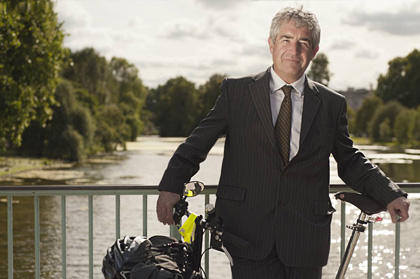 Tony Juniper is one of Britain’s best-known environmental campaigners and a former director of Friends of the Earth. His previous books include What Has Nature Ever Done for Us?, Saving Planet Earth and Spix’s Macaw. What Nature Does for Britain is published by Profile Books in paperback and eBook. Read more.
Tony Juniper is one of Britain’s best-known environmental campaigners and a former director of Friends of the Earth. His previous books include What Has Nature Ever Done for Us?, Saving Planet Earth and Spix’s Macaw. What Nature Does for Britain is published by Profile Books in paperback and eBook. Read more.
tonyjuniper.com
Author portrait © Danielle Da Silva
Mark Reynolds is a freelance editor and writer, and a founding editor of Bookanista.

